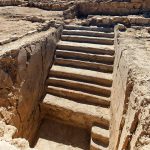Here are four truths to help us be more patient with others, ourselves, and Jesus’ plan:
1) People grow organically, so be patient with them and with yourself. St. James writes, “The farmer waits for the precious crop from the earth, being patient with it until it receives the early and the late rains. You also must be patient” (Jas 5:7-8). Farming is organic; nothing happens quickly; farmers have to wait for the rain and sun. In the same way, people take years to grow. One of the most helpful things I ever heard was when Deacon Andrew told me to be more patient with people, reminding me that, when he was in his forties, God wasn’t the center of his life. He wasn’t close to God and the only thing he had going for him was his looks. That gave me hope, because, if I have to wait decades for the people I love to love Jesus and to become like Deacon, then I’ll wait. People need time to grow. I just wish they’d hurry up.
One family psychologist noted that if we remind our children daily to say, ‘Thank you,’ for ten years, that’s over three thousand times. That’s how long it takes. Parenting is a 30-year process. When someone said to the psychologist, ‘You’ve got great kids,’ he responded, ‘Yes, but give them another 20 years and we’ll find out for sure.’
In the future, we’ll talk about limits to our patience, so that no one abuses us, but that’s for another time, not now.
We acknowledge that farmers still work hard, but do so calmly. A wise man said to me that renewing our parishes will take a generation, so I thought about the next 16 years for St. Anthony’s to become really healthy. I’ll be 58 years old then, Deacon will be 86, the kindergarten students will have finished first year after high school, how old will you be in 2038?
2) God will come through on His promises, which means we’ll get everything we need, not everything we want. “Be patient, brothers and sisters, until the coming of the Lord… Strengthen your hearts, for the coming of the Lord is near” (Jas 5:7-8). This letter was written to Christians who had been forced to leave their homes and cities because of persecution, and so they were waiting for God to provide for them. What did God promise He would provide? We need to remember that Jesus never said our life would be easy and that we wouldn’t suffer. Let’s be clear: We’re all going to suffer because that’s the human condition. But God did promise that we will never be tried beyond our strength.
God never said we’ll be cured of cancer, that we’ll have enough money to live in Vancouver, or that our loved ones will thrive in life. We must strengthen our hearts by living in reality.
And Jesus will grant us justice: Eventually, those who do evil will be punished and the righteous will be rewarded. That’s one of the ‘comings’ to which St. James is referring here, when he says that ‘the coming of the Lord is near.’
3) Going to Confession makes us more patient. “Brothers and sisters, do not grumble against one another, so that you may not be judged” (Jas 5:9). You know how, after Confession, we’re kinder and more patient with others, and don’t grumble as much? That’s because we’re more aware of our own sins and God’s judgment on ourselves. One spiritual author said that the best way to grow in humility is to remember your own sins. The same goes for patience. If we’re impatient with our family and co-workers, it would help if we went to Confession more.
4) Follow the saints who were very patient. “As an example of suffering and patience, brothers and sisters, take the Prophets who spoke in the name of the Lord” (Jas 5:10). Today, we hear Jesus call St. John the Baptist the greatest of prophets, and even his faith was tested. We know from the historian Flavius Josephus that St. John was held in the Fortress of Machaerus, east of the Dead Sea.
These pictures give us a better idea of what he was going through: He had been wrongfully arrested, presumably led in chains up the mountain, then held in prison.
He was being held here because he told King Herod that he should not commit adultery with another man’s wife. The Gospel today tells us that, while in prison, John was allowed to have visitors, and he sent them to Jesus with the question, “Are you the one who is to come, or are we to wait for another?” (Mt 11:3). We can surmise from this question that he needed reassurance about Jesus’ identity. John had followed God’s will perfectly, and now was suffering for it. What was going through his mind? ‘Is God abandoning me? Will Jesus come and get me out of here?’
Jesus’ response was: “Go and tell John what you hear and see: the blind receive their sight, the lame walk, the lepers are cleansed, the deaf hear, the dead are raised, and the poor have good news brought to them. And blessed is anyone who takes no offence at me” (Mt 11:4-5). Jesus saved people from suffering as a sign of healing from sin, which is why He didn’t save John, His older cousin by sixth months. John stayed in the fortress, until Herod’s new wife’s daughter danced for him and asked him to behead John.
John was patient with God’s plan and was faithful to the end. He was vindicated only after his death—that’s worth pondering. Sometimes God only vindicates us after we die. There was a famous saint named John Henry Newman, of whom many ideas were rejected by theologians while he lived. Nevertheless, he was vindicated over 70 years after his death. In addition, I think of the patience of many people here who donated to our parish center for years but died before seeing it completed. They were never impatient with God’s plan, but trusted in His timing. And while we pray with all our hearts that the City of Vancouver grant our Development Permit, we also trust in God’s timing.
We should always resist impatience when it comes to us. Furthermore, we should pray to see things the way God does, in light of eternity, and His goal is to make us saints. During Advent, when we wait for Jesus to come, we remember that God the Father is the most patient farmer. Patience means seeing things the way God sees them.








